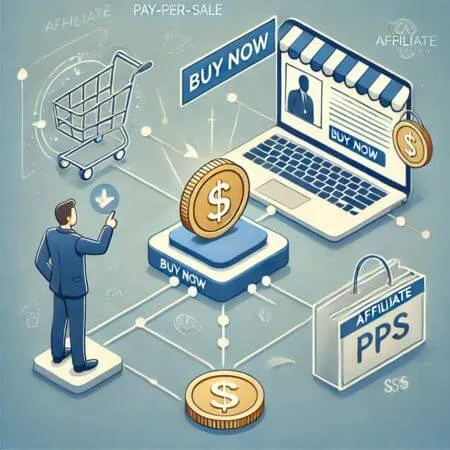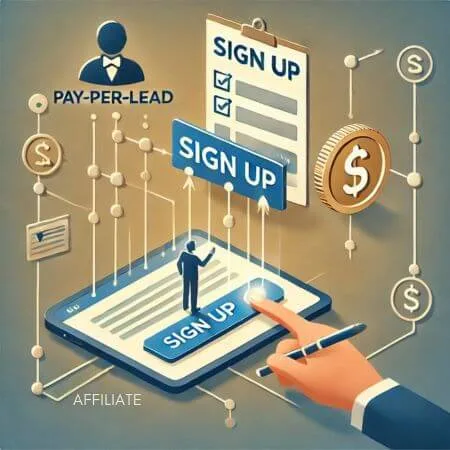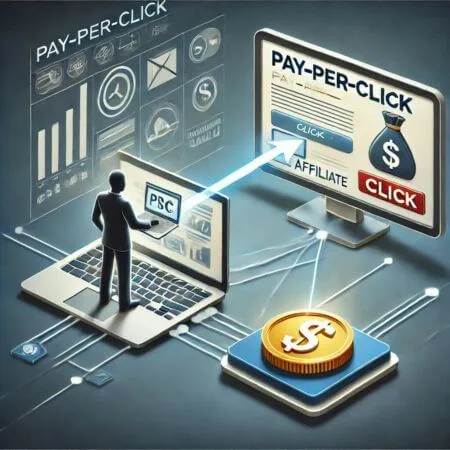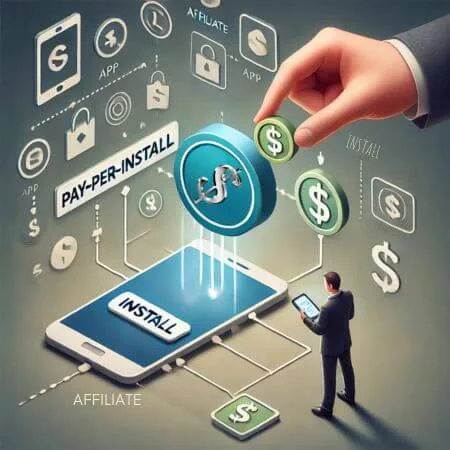Last updated on January 4th, 2025 at 08:13 pm
So, you’ve heard about affiliate marketing and want to know how it can put money in your pocket, right? Understanding how affiliate marketers get paid is crucial whether you’re just starting or looking to maximize your affiliate income. Let’s break down the most common payment models, explore what you can earn, and provide practical tips to help you succeed.

Understanding Affiliate Marketing
Affiliate marketing is a partnership where you promote a company’s products or services, and when someone makes a purchase or completes an action through your link, you earn a commission. This setup is a win-win—companies get more sales, and you earn a cut. But how exactly does that payment process work? Let’s dive in.
How Do Affiliate Marketers Get Paid?
Affiliate marketers typically earn through several payment models. Here’s what you need to know about each one:
Pay-Per-Sale (PPS)
This is the most common way affiliate marketers earn money. You get paid when someone makes a purchase using your unique affiliate link. The commission is usually a percentage of the sale or a flat fee.

Example: If you promote a software subscription for $100 and the program offers a 15% commission, you earn $15 for each sale.
Pros:
- Higher earnings potential because commissions are tied to actual sales.
- Merchants are more willing to pay since they only pay for results.
Cons:
- It can take time to make your first sale, especially if you’re only just starting.
- You need effective marketing skills to persuade people to buy.
Amazon, Shopify, and eBay. are some of the most popular brands offering PPS affiliate programs. These programs are known for their reliability and wide range of products or services, making them great options for beginners and experienced marketers alike.
Pay-Per-Lead (PPL)
Pay-per-lead means you earn a commission when someone completes a specific action, such as signing up for a free trial, filling out a form, or subscribing to a newsletter.

Example: A web hosting company might pay you $10 for each person who signs up for a free consultation through your link.
Pros:
- Easier to convert than direct sales since there’s no upfront cost for the customer.
- Useful for products or services with a longer sales cycle.
Cons:
- Generally lower commissions than Pay-Per-Sale.
- Quality of leads can impact your long-term partnership with the merchant.
Some of the most popular brands offering PPL affiliate programs include Hiscox, FreshBooks, and Semrush. These companies provide high-quality services with a strong demand for free trials and demos, making them ideal for affiliates focusing on lead generation.
Pay-Per-Click (PPC)
With Pay-Per-Click, you earn money each time someone clicks on your affiliate link, even if they don’t make a purchase. While less common, this model is used for specific types of products or services where visibility matters.

Example: A travel site might pay $0.20 for every click to their booking platform through your link.
Pros:
- Easier to earn since you don’t rely on conversions.
- Ideal for affiliates with high-traffic websites or large audiences.
Cons:
- Low commissions mean you need a lot of clicks to make significant money.
- Harder to find programs that offer PPC models.
Some of the most popular ad networks offering PPC programs include Google AdSense, Media.net, Ezoic, and PropellerAds. These networks work well for websites with significant traffic, offering a chance to earn from clicks alone.
Pay-Per-Install (PPI)
This model is popular in the tech industry. You earn a commission every time a user installs an app or software through your link.

Example: A gaming app might pay $2 for every successful installation.
Pros:
- High conversion rates as users only need to install the app.
- Great for affiliates with tech-savvy audiences.
Cons:
- Not suitable for all niches.
- Lower earnings per install compared to other models.
Some of the most popular networks offering PPI affiliate programs are CPALead, AdWorkMedia, and CInstaller. These companies rely on app downloads and software installations, making them ideal for affiliates in the tech and gaming niches.
How Much Money Do Affiliate Marketers Earn?
Now, let’s get to the question everyone’s curious about: How much can you actually earn as an affiliate marketer? The answer varies widely depending on your niche, audience size, and promotional efforts.
- Beginner Affiliates: Expect to make anywhere from $50 to $500 per month. These are marketers still building their audience and learning how to promote effectively.
- Intermediate Affiliates: With a decent-sized audience and a better understanding of affiliate marketing, you can earn between $500 and $2,000 per month.
- Advanced Affiliates: Full-time affiliate marketers who know their niche well and have a strong audience can make $2,000 to $10,000+ per month. Some even go beyond that, especially if they focus on high-ticket items or build entire websites around affiliate content.
Factors That Affect Your Earnings
- Commission Rate: Higher commission rates mean higher earnings. For instance, promoting a product with a 30% commission offers more earning potential than a 5% commission.
- Product Price: High-ticket items like software subscriptions or luxury products offer larger commissions but may be harder to sell.
- Traffic Volume: More traffic means more chances for conversions. Building a blog, a YouTube channel, or a large social media following can be game-changing.
- Conversion Rate: This is the percentage of people who buy or sign up after clicking your link. Good content, clear calls-to-action, and targeting the right audience can improve this.
- Cookie Duration: Some affiliate programs track sales for a certain period after a user clicks your link. Longer cookie durations increase your chances of earning, even if the customer doesn’t buy right away.
Affiliate Marketing Payment Methods
Once you start earning commissions, how do you actually get paid? Different programs offer different methods, including direct bank transfers, PayPal, and even cryptocurrency. PayPal is a popular choice for many affiliates because of its convenience and global reach.
- Bank Transfers: Directly deposit your earnings into your bank account.
- PayPal: A popular and convenient option for international affiliates.
- Checks: Some programs still offer physical checks, though they’re slower.
- Cryptocurrency: A few affiliate programs now pay in Bitcoin or other cryptocurrencies, offering an alternative for tech-savvy marketers.
Make sure to check each program’s payment terms, including minimum payout thresholds, to determine when and how you’ll receive your commissions.
Tips to Maximize Your Affiliate Earnings
Now that you know how payments work, let’s talk about how to boost your earnings. Here are some tried-and-true strategies:
- Focus on Quality Products: Promote products or services you genuinely believe in and match your audience’s interests. People can sense when you’re being authentic and are more likely to trust your recommendations.
- Leverage Multiple Platforms: Don’t just rely on one channel. Promote your affiliate links using a mix of blog posts, YouTube videos, social media, and even email marketing. The more visibility, the better your chances of earning.
- Build Trust with Your Audience: Your audience needs to trust you before they buy through your links. Share personal experiences, provide honest reviews, and be transparent about your affiliate relationships. Trust goes a long way in affiliate marketing.
- Use Tracking Tools: Affiliate tracking tools can help you see which products perform best and which channels drive the most sales. This allows you to focus on the most profitable areas and fine-tune your strategies.
- Diversify Your Income Streams: Don’t put all your eggs in one basket. Join multiple affiliate programs within your niche to test which ones yield the highest returns. This protects you from changes in any program and allows you to explore new opportunities.
Top Paying Affiliate Programs to Consider
If you’re looking for high-earning opportunities, consider programs that offer competitive commission rates and long cookie durations. Here are a few worth exploring:
- ClickBank: Great for digital products with higher commission rates (up to 75%). Ideal if you’re in the e-books or software space. Sign up for Clickbank here.
- ShareASale: A platform with thousands of affiliate programs offering a mix of physical and digital products. Register with ShareASale here.
- High-Ticket Programs: Software, web hosting, and financial services often offer high-ticket offers, with commissions reaching $100 or more per sale..
Next Steps: Pick Your Niche
Focusing on a specific niche is one of the best ways to maximize your earnings as an affiliate marketer. Why? A niche allows you to target a more defined audience, build trust, and establish yourself as an expert. When your audience sees you as a go-to resource, they’re more likely to trust your recommendations and click on your affiliate links.
But how do you choose the right niche? It’s not just about picking something you’re interested in—it’s about finding a niche with potential for profitability. Consider factors like market demand, competition, and available affiliate programs. Check out this resource for a step-by-step guide on choosing a profitable niche that aligns with your interests and skills.
Affiliate marketing offers a flexible way to earn money online, but understanding the different payment models and strategies is key to maximizing your earnings. Whether you’re earning a few dollars a month or aiming for a full-time income, focusing on the right products, building trust with your audience, and leveraging multiple platforms can make all the difference.
By knowing how affiliate marketers get paid and how much you can earn, you’re already a step ahead of the competition. So, implement these strategies and start working toward those commissions!



